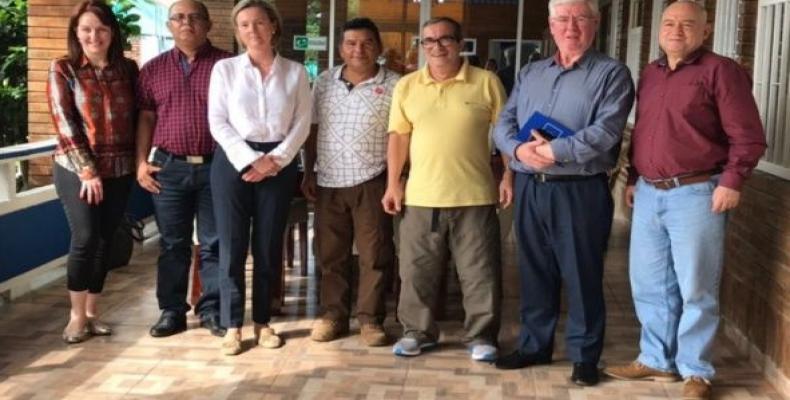Bogota, April 27 (RHC)-- In Colombia, Rodrigo "Timochenko" Londoño, president of the Common Alternative Revolutionary Force (FARC), has thanked the European Union's special envoy for the Colombian peace process, Eamon Gilmore, for reaffirming the bloc's support for the accord, which was signed between the former guerrilla group and the government in 2016.
Gilmore, who arrived in Colombia earlier this week, visited Jesus Santrich, a leader in the now disarmed guerrilla group. Santrich has been accused of drug trafficking, and the United States has requested his extradition on the charges, which he firmly denies.
"In the fruitful meeting with the representatives of the European Union, we analyze the political situation and the difficulties that the peace process has undergone, especially regarding the implementation of the agreements, and the EU reiterates its unwavering support," Londono tweeted.
The meeting between Londoño and Gilmore also included the EU Ambassador to Colombia, Patricia Llombart.
Gilmore is scheduled to meet with government officials, civil society groups, the leadership of FARC's political party and others to discuss the ongoing peace process. The purpose of the visit is to reaffirm the EU's commitment to the full implementation of the peace agreement, including reincorporation of former guerrillas into civil society and rural development.
Londoño emphasized that Gilmore aims to improve the mechanisms and efforts to consolidate peace in Colombia and to facilitate an increase in the access to state funding for development projects.
Last June, the FARC handed in the last of its weapons to United Nations officials, effectively ending 53 years of war with the state, a move which analyst say has exposed its members to violence by other paramilitary operatives.
Since the demobilization process began, many former rebels have been arrested by authorities and assassinated by paramilitary forces, raising concerns that the violence inflicted on the Patriotic Union party during the 1980s and '90s could be repeated.
Juan Manuel Santos' government has denied the existence of paramilitary groups in the country, despite repeated warnings by the United Nations.
FARC's leadership reaffirms commitment to peace, thanks European Union for support

Artículos Relacionados
Comentarios
Deja un comentario
Todos los campos son requeridosMás Vistas
- Cirujano italiano comparte saberes prácticos y teóricos en Cuba
- Se desarrolla en Cuba Festival de documentales Santiago Álvarez
- Jefe de Estado cubano sostuvo encuentro con delegados al IV Coloquio Patria (+Fotos)
- Cuba, un ejemplo de resistencia comunicacional para el mundo
- Amenazas a cárteles del narcotráfico en México destacan en oratoria de Trump

